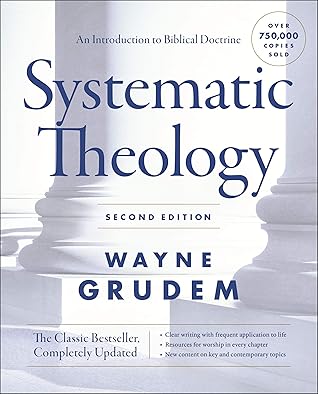More on this book
Community
Kindle Notes & Highlights
by
Wayne Grudem
Read between
March 15 - December 27, 2021
If we think the same thing God thinks about anything in the universe, we are thinking truthfully about it. Our definition also affirms that God’s words are both true and the final standard of truth.
God always does what he promises to do, and we can depend on him never to be unfaithful to his promises. Thus he is “a God of faithfulness” (Deut. 32:4).
God’s faithfulness means that God will always do what he has said and fulfill what he has promised (Num. 23:19; cf. 2 Sam. 7:28; Ps. 141:6, et al.).
Whatever the area of our investigation, when we discover more truth about the nature of reality, we discover more of the truth that God already knows. In this sense we can affirm that “all truth is God’s truth”
MORAL ATTRIBUTES 6. Goodness
The goodness of God means that God is the final standard of good, and all that God is and does is worthy of approval.
What is good? Good is what God approves.
there is no higher standard of goodness than God’s own character and his approval of whatever is consistent with that character.
7. Love
God’s love means that God eternally gives of himself to others.
8. Mercy, Grace, Patience
God’s mercy, grace, and patience may be seen as three separate attributes or as specific aspects of God’s goodness.
God’s mercy means God’s goodness toward those in misery and distress.
God’s grace means God’s goodness toward those who deserve only punishment.
God’s patience means God’s goodness in withholding of punishment toward those who s...
This highlight has been truncated due to consecutive passage length restrictions.
God’s patience,
The Old Testament frequently speaks of God as “slow to anger”
9. Holiness
God’s holiness means that he is separated from sin and devoted to seeking his own honor.
10. Peace (or Order)
1 Corinthians 14:33 Paul says, “God is not a God of confusion but of peace.”
Paul says that God’s actions are characterized by “peace” and not by “disorder”
God’s peace means that in God’s being and in his actions he is separate from all confusion and disorder, yet he is continually active in innumerable well-ordered, fully controlled, simultaneous actions.
11. Righteousness, Justice
God’s righteousness means that God always acts in accordance with what is right and is himself the final standard of what is right.
we may ask, what is “right”? In other words, what ought to happen and what ought to be? Here we must respond that whatever conforms to God’s moral character is right.
12. Jealousy
God’s jealousy means that God continually seeks to protect his own honor.
13. Wrath
God’s wrath means that he intensely hates all sin.
What is it about our culture or our way of thinking today that makes us think of the physical world as more real and more permanent than the spiritual world?
Exodus 34:6–7: The LORD passed before him and proclaimed, “The LORD, the LORD, a God merciful and gracious, slow to anger, and abounding in steadfast love and faithfulness, keeping steadfast love for thousands, forgiving iniquity and transgression and sin, but who will by no means clear the guilty, visiting the iniquity of the fathers on the children and the children’s children, to the third and the fourth generation.”
The Character of God: “Communicable” Attributes (Part 2)
D. ATTRIBUTES OF PURPOSE
14. Will
God’s will is that attribute of God whereby he approves and determines to bring about every action necessary for the existence and activity of himself and all creation.
Sometimes it is God’s will that Christians suffer, as is seen in 1 Peter 3:17,
“For it is better to suffer for doing good, if that should be God’s will, than for doing evil.”
“Therefore let those who suffer according to God’s will entrust their souls to a faithful Creator whi...
This highlight has been truncated due to consecutive passage length restrictions.
God’s necessary will and God’s free will.
God’s necessary will includes everything that he must will according to his own nature.
God’s free will includes all things that God decided to will but had no necessity to will according to his nature.
God’s decision to create the universe and all the decisions relating to the details of that creation.
God’s secret will and his revealed will.
According to Moses, “The secret things belong to the LORD our God, but the things that are revealed belong to us and to our children forever, that we may do all the words of this law” (Deut. 29:29).
This revealed will of God is God’s declared will concerning what we should do or what God commands us to do.
God’s secret will includes most of his hidden decrees by which he governs the universe and determines everything that will happen.
Paul says that God “desires [or ‘wills, wishes,’ Gk. theleō] all people to be saved and to come to the knowledge of the truth” (1 Tim. 2:4).
New Testament is clear that there will be a final judgment and not all will be saved.
Romans 9:18 (“He has mercy on whomever he wills, and he hardens whomever he wills”) and Acts 4:28 (“to do whatever your hand and your plan had predestined to take place”) as references to God’s secret will.


